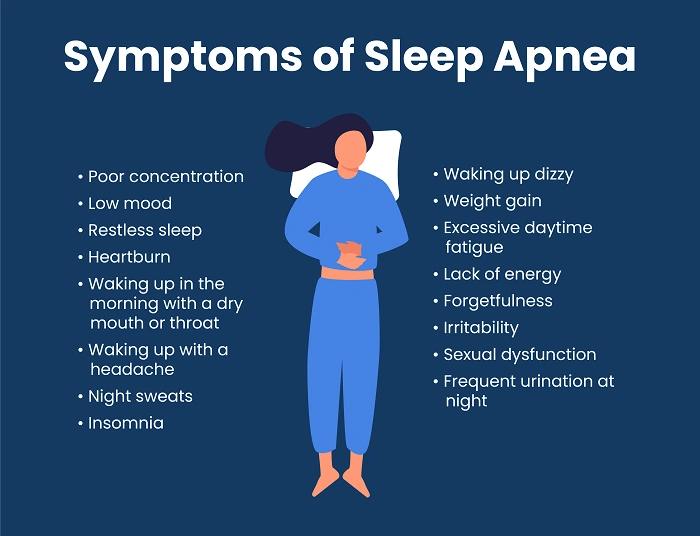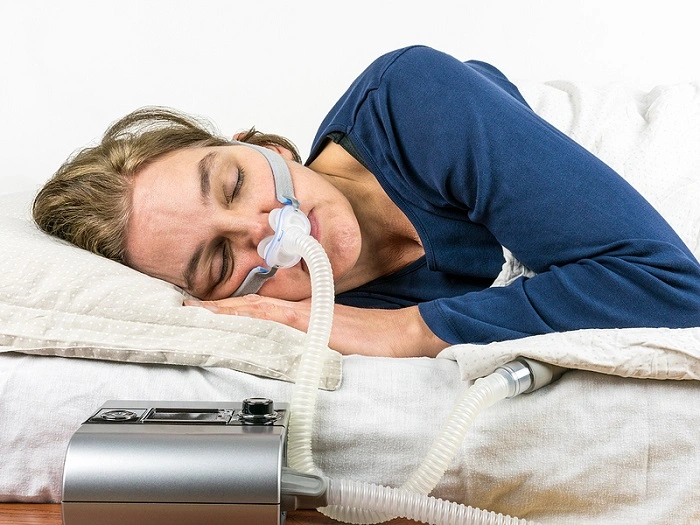Do you snore greatly at night? Do you feel tired in the morning even after a good night’s sleep? Do you ever wake up feeling that you are not breathing at night? If you have answered “yes” to any of them, then you might have sleep apnea.
Sleep apnea is a sleep disorder. In it breathing not only ceases but starts over and over again during sleep. Most people are unaware that they have it. However, if left untreated, it will impact your health. It will impact your mood, and energy level too.
A quick way to have an idea if you might have it is by taking a quiz. A quiz won’t diagnose, but it will give you an indication if you are at risk or need to consult your doctor.
Today in this blog we are going to discuss what sleep apnea is, how symptomatic it is, risk factors, the questions that you can do at home, and what’s next.
What is Sleep Apnea?
Sleep apnea is when you cease breathing for a short time during sleep. It can happen an astronomical number of times throughout the night. Every time that you cease breathing will decrease the amount of oxygen in your blood. Your brain will temporarily wake you up so that you will breathe again.
Thus, people suffering from it never experience deep, refreshing sleep. They will snore, choke, gasp for air, or wake up.
There are three broad categories of sleep apnea:
- Obstructive Sleep Apnea (OSA): Most common. Happens when your airway is blocked by very flabby muscles in your throat.
- Central Sleep Apnea (CSA): It happens when the brain neglects to send the appropriate signals. Which goes to the breathing muscles.
- Complex Sleep Apnea Syndrome: OSA and CSA combined.
Why Sleep Apnea is Serious

Sleep apnea is not like all snoring. If left untreated, it can lead to:
- Daytime sleepiness – chronic sleepiness.
- Morning headaches.
- Trouble concentrating and remembering.
- Heart complications like high blood pressure, heart attack, and stroke.
- Risk of diabetes.
- Depression and mood swings.
So early detection of the symptoms must be there.
The Sleep Apnea Quiz
It is simple to attempt this speedy quiz. Respond “Yes” or “No” truthfully to the questions below:
- Do you snore extremely hard?
- Do you often have daytime fatigue, drowsiness, or sleepiness?
- Has a bed partner or family member ever seen you stop breathing, choke, or gasp for air at night?
- Do you have high blood pressure or its medication?
- Are you obese or overweight?
- Is your neck measurement larger than 17 inches (men) or 16 inches (women)?
- Are you more than 40 years of age?
- Do you wake up with a sore throat or dry mouth?
- Do you wake up and very frequently get up at nighttime?
- Do you experience difficulty concentrating or remembering?
Scoring the Quiz
- If you answered Yes to 0–2 questions → Low risk.
- If you answered Yes to 3–4 questions → Medium risk.
- If you answered Yes to 5 or more questions → High risk.
If your risk is medium or high, you would prefer to talk to your doctor or a sleep specialist.
Risk Factors for Sleep Apnea
There are some people who are more likely to have sleep apnea than others. Risk factors are:
- Being overweight
- Having a larger neck size
- Being over 40 years of age
- Inherited apnea
- Alcohol or sedative consumption
- Having allergies or congestion in the nose
Identifying your risk factors could push you to seek assistance earlier.
Warning Signs You Should Take the Quiz
These are informative warning signs that you should not overlook:
- Each evening, nocturnal snoring
- Choking or gasping when waking up in the middle of the night
- Holding breaths observed by a sleeping bed partner
- Daytime sleepiness in excess while working or traveling
- Morning headaches when waking in the morning
- Mood changes like irritability or depression
If these are familiar, the quiz is a great starting point to better health.
What Is Done After the Quiz
Assuming your risk for the quiz is medium or high, don’t worry. Next is visiting a doctor.
Doctors can:
- Do a sleep study (polysomnography): You overnight at a sleep clinic and machinery monitors your breathing, heart rate, and oxygen.
- Home sleep test: Physicians have you take small devices to breathe through at home.
- Screen your medical history: Weight, blood pressure, and family background are examined.
Treatment for Sleep Apnea

Good news is that sleep apnea is treatable. Some of the treatment is as below:
Lifestyle changes:
- Weight loss if overweight
- Side sleeping, not on back
- Avoiding alcohol at night
- Stopping smoking
CPAP machine (Continuous Positive Airway Pressure):
- While nighttime sleeping that keeps airways open.
Oral appliances
- Mouth guards that don’t allow airway blockage.
Surgery:
- For highly blocked airways in patients.
Nasal problem treatment:
- With the assistance of sprays, allergy medication, or nasal congestion surgery.
Also Read: Union West: A New Community for Families, Healthcare, and Community
How the Quiz Assists You
The sleep apnea quiz is not a doctor’s diagnosis. But it can assist you:
- To listen to your symptoms.
- To determine your risk level.
- To decide about seeing a doctor.
- Act in your own health.
Living Well with Treated Sleep Apnea
Individuals who treat sleep apnea generally say that they:
- Sleep more soundly and wake up feeling rested.
- Feel less tired throughout the day.
- Feel less stressed and content.
- Have better concentration and memory.
- Have lower blood pressure and other health hazards.
Conclusion
Sleep apnea is common but less commonly understood. Taking a test is a simple means to determine if you could be at risk. If you receive a medium or high risk score. Then it would make sense to discuss it with your doctor.
Remember, the quiz is only a guide. Accurate diagnosis is a sleep test. But by taking the quiz, you’ve already taken the first step. It will lead you toward better sleep, better health, and better living.
So if you, or someone you care about, are loud snorers, day tired, or sleeping poorly. Then take the sleep apnea quiz today. It might be a change that will change your life.


